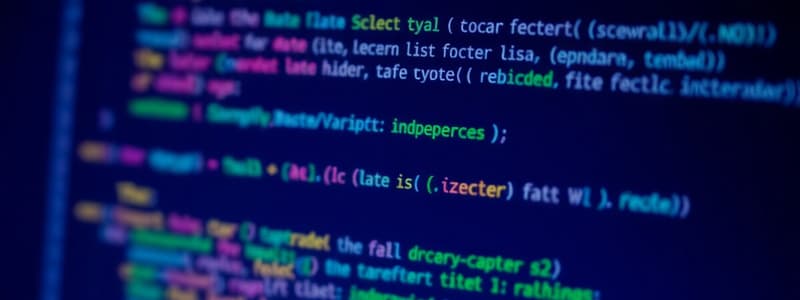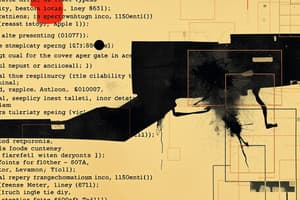Podcast
Questions and Answers
Which of the following is a user-defined data type in C?
Which of the following is a user-defined data type in C?
- struct (correct)
- float
- int
- char
What is the purpose of a declaration statement in C programming?
What is the purpose of a declaration statement in C programming?
- To indicate the type and name of variables (correct)
- To create loop control with specified conditions
- To define the structure of a function
- To assign values to variables
What is the result of using the && operator in a conditional statement?
What is the result of using the && operator in a conditional statement?
- Performs arithmetic addition
- Performs logical AND between two conditions (correct)
- Compares two values for equality
- Assigns a value to a variable
Which keyword cannot be used as an identifier in C programming?
Which keyword cannot be used as an identifier in C programming?
What scope do variables defined within a function have?
What scope do variables defined within a function have?
Which of the following correctly describes a runtime error?
Which of the following correctly describes a runtime error?
Which statement about pointers is correct?
Which statement about pointers is correct?
What is the correct syntax for a single-line comment in C?
What is the correct syntax for a single-line comment in C?
Study Notes
Syntax of C Programming
-
Basic Structure:
- Every C program includes preprocessor directives (
#include), followed by amain()function. - Functions consist of a return type, function name, parameters, and body.
- Every C program includes preprocessor directives (
-
C Statements:
- Declaration Statement: Indicates the type and name of variables (e.g.,
int a;). - Expression Statement: Assigns values or performs calculations (e.g.,
a = 5;). - Control Statements: Include conditionals (
if,switch) and loops (for,while).
- Declaration Statement: Indicates the type and name of variables (e.g.,
-
Comments:
- Single-line comments use
//. - Multi-line comments are enclosed in
/* ... */.
- Single-line comments use
-
Identifiers:
- Names for variables/functions must start with a letter or underscore, followed by letters, digits, or underscores.
- Case-sensitive.
-
Keywords:
- Reserved words in C (e.g.,
int,return,void,while) that cannot be used as identifiers.
- Reserved words in C (e.g.,
Semantics of C Programming
-
Data Types:
- Primary types:
int,char,float,double. - User-defined types:
struct,union,enum.
- Primary types:
-
Operators:
- Arithmetic (
+,-,*,/,%). - Relational (
==,!=,<,>,<=,>=). - Logical (
&&,||,!). - Assignment (
=,+=,-=, etc.).
- Arithmetic (
-
Control Flow:
- Conditional Statements: Control execution based on conditions (
if,else,switch). - Loop Statements: Repeat code blocks (
for,while,do-while).
- Conditional Statements: Control execution based on conditions (
-
Function Semantics:
- Functions can return values or be void.
- Parameters can be passed by value or by reference.
-
Memory Management:
- Variable storage: stack (local variables) and heap (dynamic memory allocation).
- Use of pointers to reference and manipulate memory directly.
-
Scope and Lifetime:
- Block Scope: Variables declared within
{}. - File Scope: Variables declared at the top level of a file.
- Function Scope: Variables defined within functions.
- Lifetime of variables depends on their scope type.
- Block Scope: Variables declared within
-
Error Handling:
- Syntax errors: Violations of language grammar.
- Runtime errors: Seek to execute invalid operations (e.g., division by zero).
These key points summarize the syntax and semantics of C programming, outlining essential concepts, structure, and behavior in coding with C.
C Programming Structure
- C programs consist of preprocessor directives (e.g.,
#include) and amain()function. - Functions have a return type, a name, parameters, and a body.
- C statements include:
- Declaration statements: Define the type and name of variables (e.g.,
int a;) - Expression statements: Assign values or perform calculations (e.g.,
a = 5;) - Control statements: Implement conditional logic (e.g.,
if,switch) and loops (e.g.,for,while)
- Declaration statements: Define the type and name of variables (e.g.,
- Comments are used to explain code:
- Single-line comments use
// - Multi-line comments are enclosed in
/* */
- Single-line comments use
- Identifiers are names for variables and functions, following these rules:
- Must begin with a letter or underscore
- Can contain letters, digits, or underscores
- Case-sensitive
- Keywords are reserved words (e.g.,
int,return,void,while) that cannot be used as identifiers.
Data Types & Operators in C
- C provides fundamental data types including:
int: Integerschar: Charactersfloat: Single-precision floating-point numbersdouble: Double-precision floating-point numbers
- User-defined data types allow for more complex data structures:
struct: Represents a collection of related variablesunion: Allows access to multiple data types using a single variableenum: Creates named constants
- Operators in C perform various actions on data and variables:
- Arithmetic operators:
+,-,*,/,% - Relational operators:
==,!=,>,<,>=,<= - Logical operators:
&&,||,! - Assignment operators:
=,+=,-=,*=,/=
- Arithmetic operators:
Control Flow in C
- Conditional statements: Control execution based on conditions:
if: Executes code block if the condition is true.else: Executes code block if theifcondition is false.switch: Tests a variable against multiple values to execute specific code blocks.
- Loop statements: Repeat code blocks for a specified number of times or until a certain condition is met:
for: Executes a set number of times.while: Executes until a specific condition is false.do-while: Executes the loop body at least once and then checks the condition.
Function Semantics in C
- Functions are reusable blocks of code that perform specific tasks.
- Parameters allow passing data to functions:
- Pass by value: Copies values to the function.
- Pass by reference: Allows functions to modify the original values.
- Functions can return values or be
void(no return value).
Memory Management in C
- C uses two main memory allocation schemes:
- Stack: Local variables are stored on the stack, allocated during function calls.
- Heap: Dynamic memory allocation happens on the heap, providing flexibility.
- Pointers: Variables that store memory addresses. They allow manipulating memory directly:
- Dereferencing a pointer allows access to the data stored at that address.
- Allocate memory dynamically using
malloc(),calloc(), andrealloc(). - Release allocated memory using
free().
Scope and Lifetime
- Scope: The region of the program where a variable is accessible.
- Block scope: Variables declared within
{}are accessible only within that block. - File scope: Variables declared at the top level of a file are accessible globally.
- Function scope: Variables defined within functions are accessible only within those functions.
- Block scope: Variables declared within
- Lifetime: The duration for which a variable exists in memory.
- Variables with block scope exist only while the block is being executed
- Global variables exist throughout the program.
- Static variables exist for the duration of the program.
Error Handling in C
- Syntax errors: Violations of language grammar leading to compilation errors.
- Runtime errors: Occur during program execution, typically due to incorrect input or invalid operations (e.g., division by zero).
- C utilizes various techniques for error handling:
- Defensive programming: Writing code to anticipate potential errors.
- Assertions: Using
assert()to check conditions at runtime and terminate the program if they are not met. - Exceptions: In modern C++, exceptions enable structured error handling.
Studying That Suits You
Use AI to generate personalized quizzes and flashcards to suit your learning preferences.
Description
This quiz covers the fundamental syntax and semantics of C programming, including basic structure, data types, and C statements. Test your understanding of comments, identifiers, and keywords essential for writing C programs.




